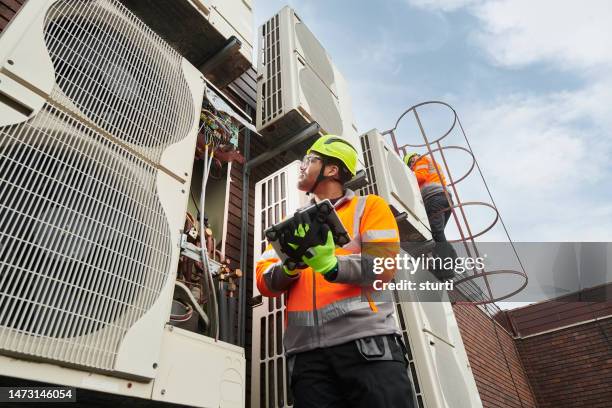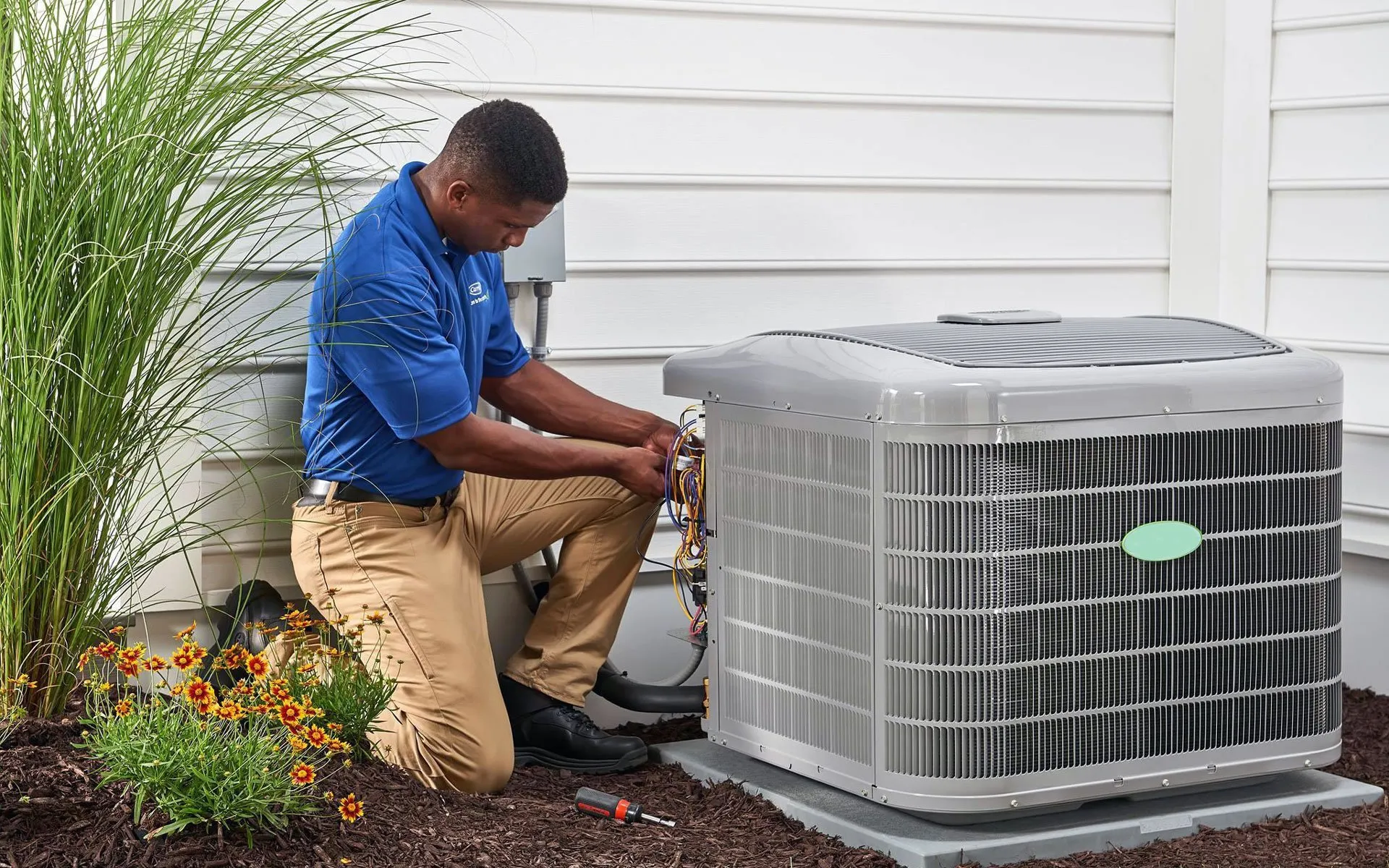Planning Ahead Before Your heat pump replacement ooltewah tn Starts
Planning Ahead Before Your heat pump replacement ooltewah tn Starts
Blog Article
Selecting In Between a Heatpump and Heater: Trick Considerations for Your Cooling And Heating Requirements
When evaluating heating choices for cooling and heating needs, the decision between a heatpump and a heating system can be complex. Each system provides distinct benefits tailored to particular environments and power effectiveness objectives. Recognizing these distinctions is important for making an educated choice. Secret aspects such as setup expenses and environmental impact even more complicate the selection process. Which alternative absolutely straightens with one's convenience and sustainability choices? The following areas will discover these factors to consider carefully.
Understanding Warmth Pumps: How They Work and Their Benefits
While several property owners consider various home heating options, comprehending how heatpump function and their advantages can considerably affect their decision. Warmth pumps run by transferring warm as opposed to producing it. In the winter months, they remove warmth from the outside air or ground and move it indoors, while in the summer season, they reverse this procedure, cooling down the home by eliminating warmth outside. This double performance makes them versatile for year-round climate control.One of the main advantages of warm pumps is their energy efficiency. They utilize substantially much less electricity contrasted to typical heater, possibly resulting in reduced energy bills (heat pump installation ooltewah tn). Furthermore, heat pumps have a smaller carbon impact, making them an environmentally pleasant selection. They likewise need much less maintenance than traditional systems, adding to long-term price savings. In general, comprehending the mechanics and advantages of heatpump can assist home owners make educated decisions concerning their home heating and cooling demands
Discovering Heaters: Types, Procedure, and Benefits
Heaters come in different kinds, consisting of gas, electrical, and oil designs, each with distinctive operational mechanisms. Comprehending these differences is crucial, as they impact performance and home heating efficiency. Furthermore, heaters supply numerous advantages, such as regular warmth result and integrity in cooler environments.
Kinds of Furnaces
Heating unit can differ substantially in layout and procedure, with heating systems being a popular selection amongst house owners. There are a number of sorts of heating systems, each making use of different gas sources and innovations. Gas heating systems are common, leveraging gas to generate warmth successfully. Electric furnaces, on the other hand, make use of electric resistance to generate heat, usually preferred for their simple installation. Oil heaters, while less usual, work in areas with minimal gas gain access to (heat pump service). Additionally, condensing heaters make best use of energy performance by catching and reusing exhaust gases. Each kind operates via a system of warm exchangers and ductwork to disperse warm air throughout a home. Comprehending the distinctions in between these furnace types is essential for educated heating and cooling choices
Benefits of Heating systems
For house owners looking for trustworthy heat throughout cold months, the benefits of heating systems are significant. Furnaces offer consistent heating, making certain also temperature levels throughout the home. They are particularly effective in extreme cold, often surpassing warm pumps in freezing problems. Numerous kinds, including gas, electrical, and oil furnaces, use adaptability to meet diverse requirements and preferences.Furnaces likewise often tend to have reduced initial installation costs compared to heatpump, making them a much more easily accessible alternative for several. Their durable layout adds to a much longer life-span, with many units lasting over 15 years with proper upkeep. Additionally, contemporary heaters are often outfitted with advanced technology for boosted effectiveness, which can bring about reduced power costs. Overall, furnaces continue to be a dependable option for efficient home heating.

Power Efficiency: Comparing Heat Pumps and Furnaces
When comparing energy efficiency between heat pumps and furnaces, the Seasonal Energy Efficiency Ratio (SEER) plays a vital function in identifying performance. Additionally, an operational expense analysis reveals the long-term economic effects of each system. Comprehending these elements can lead home owners in making informed choices regarding their heating solutions.
Seasonal Energy Performance Ratio
Power effectiveness plays an essential function in the decision-making process between warm pumps and heating systems, especially when thinking about the Seasonal Energy Efficiency Proportion (SEER) This metric steps the cooling efficiency of heat pumps over a whole cooling season, providing a standardized way to review efficiency. Greater SEER scores show greater power efficiency, translating to reduced power intake and minimized energy bills. In contrast, heating systems are typically assessed utilizing the Yearly Gas Utilization Performance (AFUE) ranking, which mirrors home heating performance. When comparing these two systems, house owners need to focus on SEER rankings for heatpump, as they directly influence total energy savings and environmental sustainability. A detailed understanding of SEER can significantly influence the long-lasting fulfillment and cost-effectiveness of the chosen cooling and heating option.
Functional Price Analysis
Understanding the functional expenses associated with heatpump and heaters is important for home owners reviewing their alternatives. Warm pumps usually supply higher power effectiveness, converting electric energy into warmth with very little waste. This results in lower month-to-month energy expenses, specifically in modest environments. Alternatively, traditional heaters, especially gas versions, may have lower upfront expenses yet can sustain higher operational expenditures with time as a result of sustain prices and effectiveness ratings.Moreover, heatpump can work as both home heating and cooling down systems, potentially lowering the requirement for different cooling and heating units. While first financial investments for heatpump may be greater, their long-term cost savings in power efficiency can make them an extra cost-effective option for several houses. Careful evaluation of neighborhood energy rates is essential to establish the ideal option.
Setup Expenses: What to Anticipate for Each Home Heating System
Installment costs for heater can differ significantly between warmth pumps and heaters, affecting house owners' choices. Warm official website pumps typically have higher in advance installation costs, typically ranging from $3,500 to $8,000, relying on the unit dimension and intricacy of setup. This includes the outside unit, interior handling system, and necessary ductwork modifications. Alternatively, furnaces have a tendency to have reduced first expenses, balancing between $2,500 and $6,000, which can be appealing for budget-conscious house owners. Setup costs can enhance if substantial ductwork is required.Moreover, the choice of gas kind for heaters-- natural gas, lp, or electric-- can also influence setup prices. While heatpump supply power efficiency, their preliminary investment might hinder some customers. Ultimately, assessing installation costs along with long-lasting financial savings and performance will certainly help house owners in making notified decisions about their heater.
Environment Considerations: Which System Carries Out Better in Your Location
Just how do environment conditions influence the efficiency of furnace? The efficiency of heatpump and furnaces can differ considerably relying on the regional climate. In modest climates, heatpump succeed by efficiently moving warm from the outdoors air, making them an energy-saving choice. Nevertheless, their efficiency lessens in very cold temperatures, where they may struggle to draw out enough heat. Conversely, heaters, specifically gas models, supply trustworthy and regular heat despite outside problems, making them more effective in colder regions.In areas that experience milder winters months, heat pumps can run efficiently year-round, supplying both cooling and heating. In contrast, areas with harsh winters frequently gain from the robustness of heaters. Inevitably, recognizing the local climate is important when deciding in between a warm pump and a furnace, as it straight affects their operational effectiveness and general performance.
Maintenance Requirements: Long-Term Treatment for Warmth Pumps vs. Furnaces
While both warmth pumps and furnaces require normal upkeep to guarantee peak efficiency, their details demands and treatment regimens differ significantly. Heating systems usually need much less constant focus, with yearly examinations sufficing to check for gas leaks, clean filters, and examine total performance. Their easier design commonly enables straightforward repairs.In contrast, warmth pumps necessitate semiannual maintenance because of their double function in cooling and heating. This includes cleansing coils, checking cooling agent levels, and ensuring that both the indoor and outdoor units operate at their finest. Furthermore, heatpump upkeep commonly entails more complex components, making professional maintenance essential.Neglecting upkeep can lead to decreased performance and enhanced energy expenses for both systems. Inevitably, homeowners must consider these long-term care requirements when choosing in between a heatpump and a heating system, as proactive maintenance can extend the lifespan and efficiency of either system considerably.
Ecological Effect: Picking a Sustainable Heating Choice
The ecological effect of heater is an essential analysis for house owners seeking sustainable choices. Heatpump are generally much more energy-efficient than traditional heating systems, as they move heat rather than create it, significantly lowering carbon emissions. By making use of renewable resource resources, such as air-source or geothermal heat pumps, house owners can further minimize their ecological footprint.On the various other hand, all-natural gas heating systems send out greenhouse gases and add to air contamination, though they frequently give higher warm result. Nonetheless, innovations in technology have actually resulted in the growth of high-efficiency furnaces that reduce emissions.Ultimately, choosing a heating unit involves weighing effectiveness versus ecological impact. Homeowners are motivated to review regional energy resources and motivations for renewable systems, ensuring an option that aligns with both individual comfort and environmental duty. The choice affects not only instant comfort but additionally long-lasting sustainability and environmental wellness.
Frequently Asked Inquiries
Exactly How Lengthy Do Warm Pumps and Furnaces Usually Last?
The lifespan of warmth pumps commonly varies from 15 to 20 years, while furnaces can last between 15 to three decades. Routine upkeep considerably affects their longevity and efficiency in offering home heating solutions.
Can I Utilize a Heatpump in Very Cold Climates?
Heatpump can operate in extremely chilly climates, however their efficiency diminishes as temperatures decrease. In such problems, extra home heating resources might be needed to maintain comfortable indoor temperature levels and ensure peak efficiency.

What Is the Noise Degree of Warm Pumps Versus Furnaces?
The sound degrees of heat pumps and furnaces differ considerably. Generally, heatpump operate even more quietly than traditional heaters, making them better for those conscious sound, while furnaces may create louder functional noises throughout home heating cycles.
Are Warm Pumps Suitable for Both Heating & Cooling?
Warm pumps are undoubtedly ideal for look what i found both cooling and heating (ductless mini splits). They function by moving warm, giving reliable temperature level control year-round, making them a functional selection for house owners looking for an all-in-one heating and cooling solution
What Size Furnace Do I Required for My Home?
Establishing the proper dimension furnace for a home calls for examining elements such as square video footage, insulation top quality, local environment, and find this the home's design. Consulting an expert can guarantee an accurate analysis and excellent comfort. Heat pumps commonly use higher power effectiveness, transforming electric power into warmth with very little waste. In modest climates, warmth pumps succeed by efficiently moving heat from the outside air, making them an energy-saving option. Alternatively, heating systems, particularly gas versions, give reliable and consistent warmth regardless of outdoor conditions, making them better in colder regions.In areas that experience milder wintertimes, heat pumps can operate effectively year-round, providing both home heating and cooling. Warmth pumps are usually a lot more energy-efficient than typical heaters, as they transfer warmth rather than generate it, significantly lowering carbon exhausts. By using eco-friendly power sources, such as air-source or geothermal warm pumps, homeowners can additionally decrease their environmental footprint.On the other hand, all-natural gas heating systems give off greenhouse gases and contribute to air contamination, though they often supply higher warm output.
Report this page